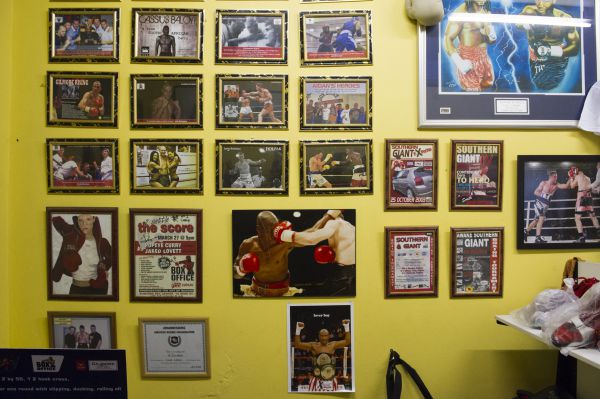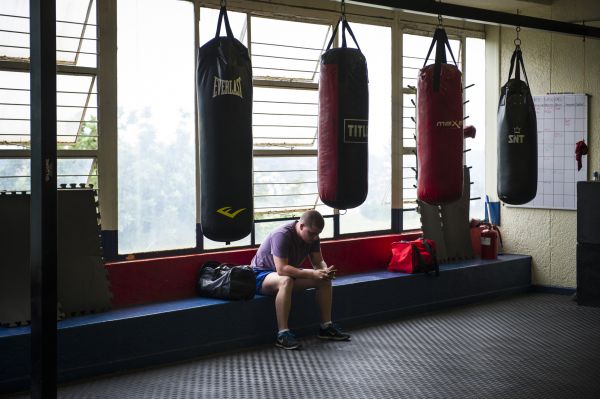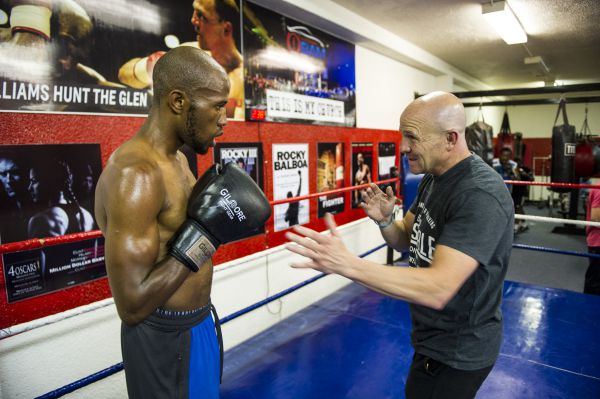Michael Mokoena is taking on South African Junior Welterweight champion Xolani Mcotheli.
At the Box Office Gym, on the edge of Rosettenville in Johannesburg, Michael Mokoena is pushing through the last few laps on the adjacent field.
Despite his quick pace, the run will merely serve as a warm-up for the day’s action. Proper training is at 7am — at which point he briskly heads inside to strap up his hands.
The gym is eerily solemn at this time. Punching bags hang dead still in the dimly lit rooms that branch off from the main corridor. All the equipment is in good condition, in keeping with the general upkeep of the place. Only an old man with a broom is wandering around.
Mokoena slides into the sparring ring, the outstanding feature of the primary exercise area, to begin his training in earnest.
His trainer, Anton Gilmore, saunters in, confident he doesn’t have to issue instructions to kick the day’s hard work into gear. He and Mokoena have been together for the majority of the boxer’s professional career and there’s an understanding between them that comes only from years of working together. Both know that there are no shortcuts to victory.
Two rows of bags float behind the arena, as well as free weights, a Smith machine and a bench press.
Promotional banners from years gone by adorn one wall, proudly displaying the feats of fighters who have trained in these halls. A chalkboard regimen is pushed to the far end. Movie posters hang across the other side, purposely fitting in with the name of the gym — the Box Office. The mix of classics and newer hits, from Rocky to Creed, are there to offer inspiration when exhaustion threatens to command the body to stop.
It’s just 10 days before a scheduled big fight so Mokoena’s delivering relatively short but high-intensity sessions — twice a day.
On Friday night, just a few days into his 30s, he was due to head into one of the most important bouts of his professional career. He would have taken on South African Junior Welterweight champion Xolani Mcotheli. A victory would have almost guaranteed him a shot at Mcotheli’s title in March.
Unfortunately, on the eve of the fight, it was announced that the event would be postponed. At the time of going to print, TLB Promotions, the organisers, cited “unforeseen circumstances” as the reason.
But Gilmore is confident the fight can be rescheduled for January, and from next week will shift gears into maintenance training before going back to “sharpening” once a new date is confirmed.

[Hit after hit: The Box Office Gym, run by former champion boxer Anton Gilmore (below), displays the posters of famous boxing movies on its walls. (Delwyn Verasamy/M&G)]

Prior to the postponement, Gilmore’s bone of contention is that the belt is not on the line now. “He deserves a title fight now,” he says. “He’s won three fights in this division.”
He goes on to explain that Mokoena, with an overall record of 11-1-0, has fought three times in the division. The problem is that only two have been consecutive since he decided to move up permanently from lightweight into the 63.5kg category. So even though he captured the Gauteng Junior Welterweight title, the authorities won’t sanction a title fight until he completes three in a row in the same division.
It’s this pedantry that has caused much frustration aimed at Boxing SA (BSA). Many have been quick to lay many of the problems clearly at its door.
For Gilmore, BSA has done a lot to improve how it operates, but still has some way to go. “They’re fixing it up. Problem is they haven’t given a lot of leeway throughout the years. In this sport you have to be flexible,” he says.
His fighter seems largely unperturbed by whatever political machinations go on behind the scenes. He’s happy to put faith in his trainer to get him the best possible deals and deliver on the day. But Mokoena has to beat what’s put in front of him right now.
And he also acknowledges problems with the state of the sport in the country and how increased development will benefit everyone involved.
“For every boxer, for every coach out there, we wish it could be better because right now it’s a struggle,” Mokoena says.
“A lack of interest and income contributes to the decline of boxing in South Africa. However, we must equally give credit to BSA … With the newly appointed board we have seen some growth. But I think it could be more.”
In anticipation of the 10-round fight, he’s replicating its format in his training — the same number of three-minute spells interrupted by 30-second breaks (half a minute shorter than the real deal). First off is some zealous shadow boxing alone in the ring before he’s joined by his trainer for some powerful pad work.
“Jab, roll, CROSS,” he shouts. “Jab, jab, swing!” Mokoena follows the instructions to the letter, without losing intensity, and is only occasionally chided for a less-than-optimum foot placement or body positioning.

[Stronger together: Michael Mokoena (left) does not need to be told by his trainer Anton Gilmore when to perform. The boxer trusts Gilmore implicitly to guide him through the tough boxing industry (Delwyn Verasamy/M&G)]
After a few rounds, it’s on to the bags — bobbing and weaving through them, he repeats his combinations. Finally it’s a bit of abs to complete the 90-minute session.
By this time, the gym has begun to fill with other fighters. Fist bumps all around as they acknowledge each other. “Like a strong piece of biltong!” a heavyweight shouts as a medicine ball is repeatedly thrown against Mokoena’s exposed stomach.
His opponent is a conventional counterpuncher, and so much of Mokoena’s training and sparring revolves around rendering Mcotheli’s style redundant — keeping him on the back foot to take the sting out of his shots.
Mokoena is very much the antithesis of the orthodox fighter — always seeking to be the aggressor and pressure a reaction instead of offering a response.
“In all my fights I dominate my opponent,” he is happy to reveal. “I’m more active than conventional fighters, more busy. That’s why in most fights when I get to the corner my coach just tells me to ‘Keep doing what you’re doing’.”
These days, it turns out getting to know who you’re up against is a simple process. “Social media is the world champion of exposing other people’s secrets,” Gilmore says. “All boxers talk too much there.”
When I meet him in his office a week later he shows me what he’s watching: a YouTube video of Mcotheli taking on a Russian fighter in 2016.
It becomes obvious while watching Mokoena train that this is a fighter who doesn’t need to be harangued to put in the effort or pushed beyond constructive criticism. His trainer would later confirm this. But it wasn’t always like that, Mokoena admits. During his amateur career he says it took him years of experience to attain the level of discipline required for turning pro.
He first set out on the boxing path midway through primary school. An avid football lover, he wanted nothing more than to play on the field close to where he lived.
When he asked his parents for the membership fee, however, he was quickly reminded that they couldn’t make such an outlay without inciting requests from his siblings. And so he settled for kickarounds on the street. Until he noticed a group of boys periodically running past his house at about 5pm. Intrigued by the prospect of being around other active youngsters, he inquired and found out about a club for underprivileged children that had recently moved to his area. There was no joining fee so he signed up.
“It wasn’t about the whole boxing [thing] itself, it was just to run with the rest of the guys every evening,” he reveals. That attitude didn’t last.
“There was one coach there, we used to call him Oom Piet. On my third day he put me in the ring with a boy that had stolen my bicycle recently. They told me he was a good boxer. I get in the ring and the coach just tells the boy ‘Slaan hom, slaan hom’.”
That day, and for the next few sparring sessions, Mokoena would go home with a bloody nose.
“I didn’t give up, I kept pushing, pushing until a point that I could actually handle him and he didn’t want to spar with me anymore. The coaches then started to take an interest in me when they saw I was there every day.”
It was at this stage that he became a boxing rarity: a right-handed southpaw.
When first asked which side he preferred, a young and unsure Mokoena said his left. From then on he was admonished and “klapped” whenever he tried to assume a more natural stance — and so he adapted.
After a few years in the gym he had reached a level where he could take on students, a role he has maintained. Teaching is something he loves to do, but there is undoubtedly an aspect of necessity to it. These days he has his own, paying, “white-collar” classes where he trains.
In addition to a prefabricated housing business Mokoena is trying get off the ground, he is an ANC Youth League chairperson in his local ward in the south of Johannesburg. It’s a role he says has kept him busy of late, especially ahead of Gauteng’s endorsement of Cyril Ramaphosa as ANC president last weekend.
And he also is a volunteer trainer at Gilmore’s second gym in Hillbrow, which aims to provide hope to the younger children in the suburb.
Having a hat in so many rings is not ideal for the development of a young boxer, but any retired professional will attest to its necessity. Surviving financially in the present is hard enough; planning for the inevitable end to a finite career is herculean.
After training, Gilmore gives me a tour of his spacious office. Decades of memories hang on the walls.
“I broke his jaw but I still ended up losing,” he says pointing to a picture of South African legend Cassius Baloyi. That fight would be Gilmore’s last until he made a comeback years later — a few exhibition bouts to raise funds for his ill son. In a more recent photo, he stands next to “Marvellous” Marvin Hagler during his visit to the Box Office.
Gilmore is quick to say how fortunate he is that he was advised to invest in two paint shops during his career. With the profit he was able to start his own gyms and regularly holds and promotes tournaments. He now has his own “Gilmore” brand of equipment —gloves, straps, headgear and the like.
But even with a handful of fighters in his stable today, the bills are not easily paid. It’s this necessity to hustle that has imbued every aspect of his life. It’s the reason he is happy to mentor young children who have been neglected by society. Boxing can save a life, but it is only the start of the journey.
The fight against Mcotheli is a pivotal moment in Mokoena’s journey and it intersects with his trainer’s. In Mokoena, Gilmore has a prodigious fighter who he realistically believes can one day bring a world title back to his gym. Bring home the national belt in March and the possibilities are endless for the pair.
“Whatever opportunities are there I’ll definitely grab with both hands,” Mokoena says as he unwraps his hands after a fierce pad session with his coach.
“But in terms of what is next for me, it’s really up to Anton. He will identify the opportunities and come back to me and we’ll decide together. But another thing we don’t want to do is plunge into situations that we’re not ready for.”